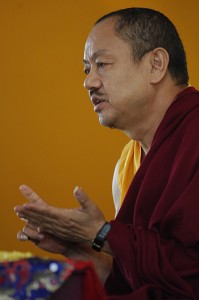The following is an excerpt from a teaching given by Khenchen Tsewang Gyatso at Kunzang Palyul Choling on Ngondro:
Precious human birth does not mean everyone who is born as a human being. It doesn’t mean that. There is precious human birth and ordinary human birth. Those who don’t do any kind of practice, those who don’t even try to go to church on weekends, those involved in New Age groups or modern ways of belief, or those who enter into some kind of entertainment and waste their lives in that manner—that is just an ordinary human birth. You really must have accumulated some merit in your previous lifetime. You must have done some kind of purification in your previous lifetime. You must have made some kind of connection with the Dharma and your lamas. That is why you are here. Otherwise there is no possibility. That would never, ever happen. So since you have a precious human rebirth, you must immediately think, “I should not waste it. I have to get some advantage from this opportunity.”
Then how can one do it? You must then think that all phenomena which are composed of cause and condition are impermanent. Impermanence does not just mean that everything comes to an end. Impermanence means that each and every moment is impermanent. Each and every moment of our lives we are becoming older and older; we are getting nearer and nearer to death. If you waste even one hour, you are one hour closer to death. If you spend your weekend enjoying yourself, still you are getting nearer to death. Whenever you sit idle, still you are getting nearer to death. Even if you do practice, still you are getting nearer to death. Even if you don’t do anything, still you are getting nearer to death. You are always getting nearer and nearer and nearer. Every sentient being who is born is subject to death.
At the same time, death is uncertain. You can see many examples. Someone will say, “Just yesterday he was talking with me, and then last night he had an accident.” Or somebody shot him or killed him or whatever. There are so many conditions that may bring death. If I cannot do actual practice and if I do not have something I can carry with me, then tonight if something happens, what can I do? What are you really going to carry with you? You cannot pack up like when you get divorced or when you get mad at your friends and you say you’re going to leave and you take your suitcase and pack all your clothes and everything and whatever money and credit cards you have and you leave and go some other place. When death comes, you cannot do that. There is no way that one could do that. Up until now in this world, even the great popes, even Milarepa, even Shakyamuni Buddha, even His Holiness Karmapa and Dilgo Khyentse Rinpoche, they left all their belongings behind. Even His Holiness Karmapa left his black hat behind, even his body. Never mind about an ordinary sentient being who cannot carry all those things. Even the great Christian popes who passed away, could not carry anything. All the great ones and not so great ones—when death came, nobody could pack anything, nobody could carry anything along. You could not even make a phone call. “I’m coming very soon, so could you please reserve a place for me?” There is no way that one can do that. You say, “Oh please, you save a better place for me since I am coming very soon.” Or you want to make a phone call to heaven. “Oh God, please save a place for me.” So you have to realize that life is like that.
In one sense, life is very long. You can experience lots of things. In another sense, life is gone like that. When death comes, what one can carry is just whatever accumulation of merit or whatever negativity one has done. That is the only thing that comes with you. Even if you don’t want it, it is stuck there and will be coming with you. So you have to realize that life is uncertain and death is uncertain. At any moment it can come. When you really consider that, you really get scared, goose bumpy. Then you really get motivated to do practice. Then your sleepy way of thinking and laziness and everything is gone just like that. You cannot feel so tired if death is coming like that. Then you can make yourself so alert. You can generate so much courage in yourself. “Why can’t I do 100,000 prostrations in a month? Why can’t I do that?” Then you can have that kind of courage within yourself. Otherwise you say, “Other people are out enjoying the weekend and going here and there and I am stuck here doing prostrations. I get pain in my legs and my knees and pain there. When can all this be finished?” Then it feels really difficult. When you really see that death is coming, then you can bear it. If you think about that, then that will really help you to apply yourself into practice with full energy and with full courage.












Impermanence – very difficult for us to accept and even more difficult to mingle with our mind stream in a meaningful way.